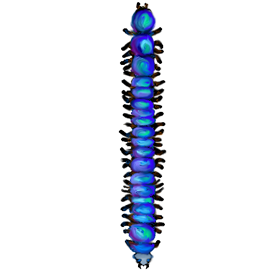Diaxwood boreworm
From Wikimalia
(Difference between revisions)
(re-posting) |
|||
| (7 intermediate revisions not shown.) | |||
| Line 1: | Line 1: | ||
{{Collection-Bugs | {{Collection-Bugs | ||
| - | |image= | + | |image=Diaxwood Boreworm.png |
| - | |name= Diaxwood Boreworm | + | |name=Diaxwood Boreworm |
| - | |habitat= | + | |habitat=Deciduous temperate forests, [[diaxwood]] trees. |
| - | |description= | + | |description=A deep blue 'fur' covers this caterpillar, causing it to stand out sharply from the diax bark on which it is almost invariably found. Slow-moving and highly sensitive to nearby movement, sometimes inducing a hostility display behavior (rearing up to its four backmost legs and waving about its nearly two-[[Measurements|thum]] upper length menacingly), the boreworm is far more likely to curl into a fuzzy blue ball. |
| - | | | + | |notes=This larval form of the [[Ebony butterfly|Ebony Butterfly]] has few natural predators, and its deep azure coloration seems to suggest that its taste is unpleasant or perhaps even toxic. Feeding exclusively on diax bark, boring deeply into the tree's wood, their diet is extremely harmful to the trees, pockmarking and scarring them with countless half-[[Measurements|thum]] holes. |
| - | |notes= This | + | [[Chandler ant|Chandler ant]]s are particularly aggressive toward them, but rather than attacking and killing them, the chandler is known to relocate them, observed on occasion depositing a boreworm to a nearby diaxwood tree of a rival colony. |
}} | }} | ||
| + | Often mistaken for centipedes, these true caterpillars are benign. This is the larval form of the [[Ebony butterfly|Ebony Butterfly]]. | ||
{{stub}} | {{stub}} | ||
Back to the [[Insect/Arachnid]] page. | Back to the [[Insect/Arachnid]] page. | ||
Current revision
| The Bug Collection | ||||||||
|---|---|---|---|---|---|---|---|---|
|
| ||||||||
| ||||||||
Often mistaken for centipedes, these true caterpillars are benign. This is the larval form of the Ebony Butterfly.
This article is a stub. You can help Wikimalia by expanding it.
Back to the Insect/Arachnid page.

